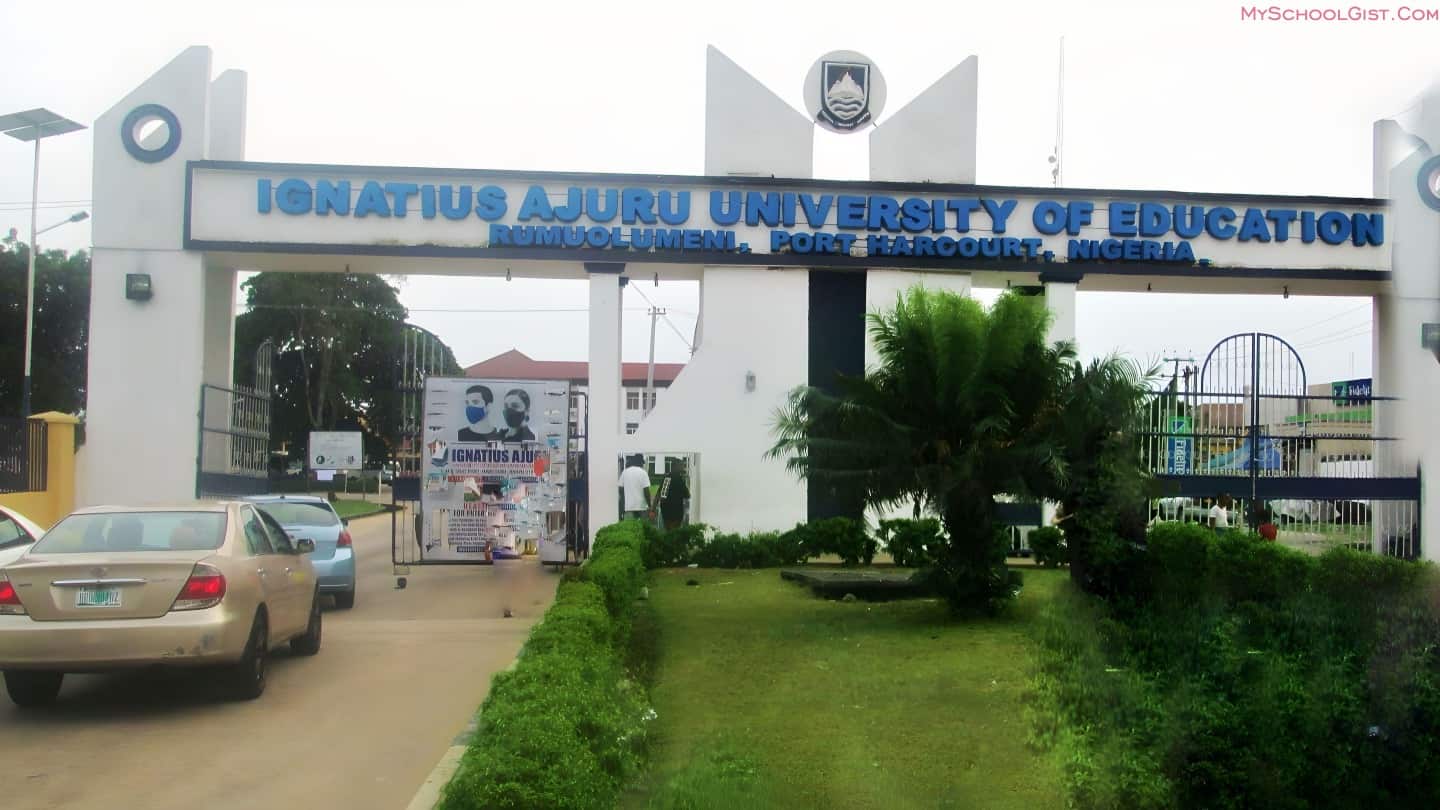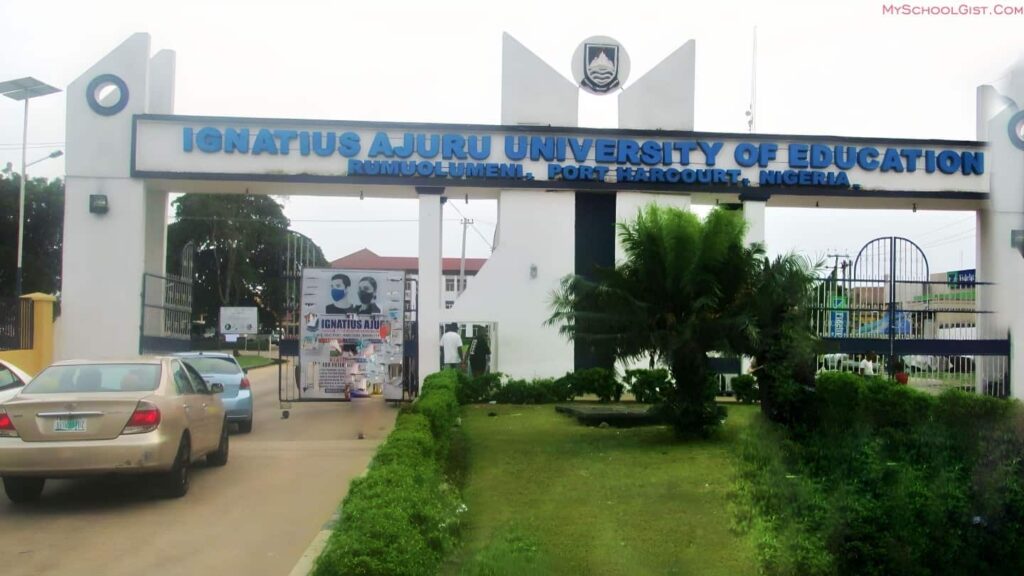Ignatius Ajuru University of Education (IAUE) has set the 2024/2025 matriculation ceremony for Saturday, 29th March 2025. Fresh students must complete registration before Friday, 14th March 2025, to get matriculation numbers. Read below for details on registration, gown collection, and other requirements.

Ignatius Ajuru University of Education (IAUE) has scheduled the 2024/2025 matriculation ceremony for Saturday, 29th March 2025, at 10 AM.
The event will take place at the University Auditorium, Rumuolumeni Campus.
Registration Deadline and Matriculation Numbers
- Fresh students must complete all registration formalities by Friday, 14th March 2025.
- Only registered students who have paid all fees will receive matriculation numbers.
- Students must pay ₦10,000 for the matriculation gown.
- Payments must be made online through the official Ignatius Ajuru University of Education portal.
Important Instructions for Fresh Students
- Students who fail to complete registration by 14th March 2025 will lose admission.
- Only students with proof of gown payment will be allowed to sign the Matriculation Register.
- Unsigned matriculation numbers will not be valid for official use.
Matriculation Gown Collection
- Gown collection from Faculty Officers starts Friday, 21st March 2025.
- Part-time students should collect gowns from the Centre for Continuing Education (CCE), St John’s Diobu Campus.
- Institute for Distance Learning (IDL) students should collect gowns from IDL offices.
Return of Academic Gowns
- All gowns must be returned by Friday, 4th April 2025.
- A penalty of ₦2,000 per day applies for late returns.
Student Identity Card Processing
- Registered students who have paid school fees must visit the ICT Centre for ID card processing.
Final Notice
- Matriculation officially marks the end of registration for the session.
- Students who fail to register before matriculation day will no longer be considered students of the university.
The Acting Vice-Chancellor congratulates all fresh students on this academic journey.
Conclusion: The State of Education in Nigeria
Education in Nigeria is a critical sector that holds the key to the nation’s development, yet it faces numerous challenges that hinder its potential to transform the country. Over the years, Nigeria has made significant strides in expanding access to education, particularly at the primary and secondary levels. The Universal Basic Education (UBE) program, launched in 1999, aimed to provide free and compulsory education for all children, reflecting the government’s commitment to improving literacy and educational outcomes. However, despite these efforts, the Nigerian education system continues to grapple with systemic issues that undermine its effectiveness and inclusivity.
One of the most pressing challenges is the inadequate funding of the education sector. Despite international recommendations that countries allocate at least 15-20% of their annual budget to education, Nigeria consistently falls short of this benchmark. This underfunding has led to a lack of infrastructure, insufficient teaching materials, and poorly equipped classrooms, particularly in rural areas. Many schools operate without basic facilities such as electricity, clean water, and functional laboratories, creating an unconducive learning environment. Additionally, the shortage of qualified teachers, coupled with low morale due to poor remuneration, has further exacerbated the quality of education.
Another significant issue is the disparity in access to education across different regions and demographics. Northern Nigeria, for instance, has some of the lowest literacy rates in the country, largely due to cultural and religious factors that discourage formal education, particularly for girls. Gender inequality remains a persistent problem, with millions of girls out of school due to early marriages, poverty, and societal norms. This disparity not only limits individual potential but also hampers national progress, as education is a powerful tool for empowering women and reducing poverty.
The quality of education is another area of concern. While enrollment rates have improved, the standard of education remains low, with many students unable to achieve basic literacy and numeracy skills. The curriculum is often criticized for being outdated and not aligned with the needs of the 21st-century economy. There is a growing demand for a shift towards skill-based and vocational education to equip students with practical skills that can address unemployment and drive economic growth. Furthermore, the frequent strikes by academic staff in tertiary institutions disrupt the academic calendar, leading to prolonged periods of inactivity and diminishing the value of degrees awarded by Nigerian universities.
Despite these challenges, there are reasons for optimism. The rise of private educational institutions and the increasing adoption of technology in education offer new opportunities for innovation and improvement. Online learning platforms, digital tools, and e-learning solutions have the potential to bridge the gap in access to quality education, especially in underserved areas. Additionally, the government and non-governmental organizations are increasingly collaborating to address issues such as girl-child education, teacher training, and infrastructure development.
In conclusion, while Nigeria’s education system faces significant obstacles, it also possesses immense potential for transformation. Addressing the challenges of funding, access, quality, and equity requires a concerted effort from all stakeholders, including the government, private sector, civil society, and international partners. By prioritizing education and implementing sustainable reforms, Nigeria can unlock the potential of its youth, foster economic growth, and secure a brighter future for generations to come. Education is not just a fundamental human right; it is the foundation upon which the nation’s progress and prosperity depend.


